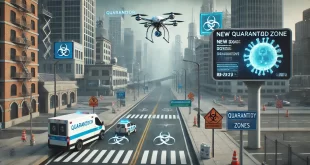What are the symptoms of the emerging corona virus? What are the most common symptoms? What are the most dangerous symptoms that can indicate serious complications? The answer can be found in this comprehensive report.
Here we are providing you with the latest medical data on the symptoms of the emerging coronavirus, “SARS Cove 2,” which causes Covid-19, according to the latest data from the World Health Organization and King’s College London.
We have counted 22 symptoms or signs of corona infection, we present them here in groups, and we confirm here that they are not a substitute for consulting a doctor, and that it is not possible to diagnose an auto corona infection.
The first group .. the most common symptoms
1- Fever
2- Fatigue
3- Dry cough
The second group… the less common symptoms:
4- Aches and pains
5- Nasal congestion
6- Headaches
7- Conjunctivitis
8- Pain in the throat
9- Diarrhea
10- lose the sense of taste
11- Loss of odor
12 – Hoarseness
13- Loss of appetite
14- Muscle pain
15- Diarrhea
16- Severe abdominal pain
17- Confusion
18- The appearance of a rash
19- Change the color of fingers or toes
The World Health Organization says most people (around 80%) usually recover from the disease without needing special treatment. But symptoms intensify in about one in five people with Covid-19 disease.
The third group .. severe symptoms
20- Difficulty in breathing.
21- Fever or cough with difficulty in breathing.
22- Fever or cough accompanied by chest pain or pressure.
The risk of developing serious complications increases in older people and people with other health problems such as high blood pressure, heart and lung disease, diabetes, or cancer.
On the other hand, some people can get infected without experiencing very mild symptoms, or even without symptoms.
6 types
What we mentioned above are full symptoms, but a recent study found that these symptoms fall into groups and hence there are 6 types of Covid-19 disease caused by infection with the coronavirus.
The study was conducted by researchers at King’s College London and published on the King’s College London website.
Researchers have found that each type of Covid-19 infection is characterized by a specific set of symptoms and that each type differs in the severity of the disease and the need to provide support to the patient’s respiratory system during the recovery phase. .
The six types of Covid-19 disease are:
The first type: flu-like, but without flu like, fever and symptoms of headache, loss of smell, muscle aches, cough, sore throat and chest pain.
The second type: flu-like, but with fever and loss of appetite (flu-like with fever) and symptoms of headache, loss of smell, cough, sore throat and hoarseness.
The third type: gastrointestinal where the patient suffers from diarrhea, with symptoms of headache, loss of smell, loss of appetite, sore throat, chest pain and no cough.
The fourth type: severe level one with fatigue, symptoms of headache, loss of smell, cough, fever, hoarseness and chest pain.
Fifth type: severe level 2, confusion, fatigue, headache, loss of smell, loss of appetite, cough, fever, hoarseness, sore throat, chest pain, and muscle pain.
Type VI: severe abdominal and respiratory level three, in which a person develops shortness of breath, diarrhea, severe abdominal pain accompanied by headache, loss of smell, loss of appetite, cough, fever, hoarseness, throat pain, chest pain and fatigue Muscle confusion and pain.
The researchers also found that the possibility that the patient in each of the six groups would need respiratory support, such as oxygen or placement on a ventilator, is as follows:
The first type: 1.5%.
The second type: 4.4%.
The third type: 3.3%.
The fourth type: 8.6%.
Fifth type: 9.9%.
The sixth type: 19.8%.
In general, the fourth, fifth, and sixth types affect older and weaker people, and they were more likely to gain weight and have pre-existing conditions such as diabetes or lung disease compared to people in the first, second and third types.
 Etudes Non Stop Study Non Stop
Etudes Non Stop Study Non Stop



